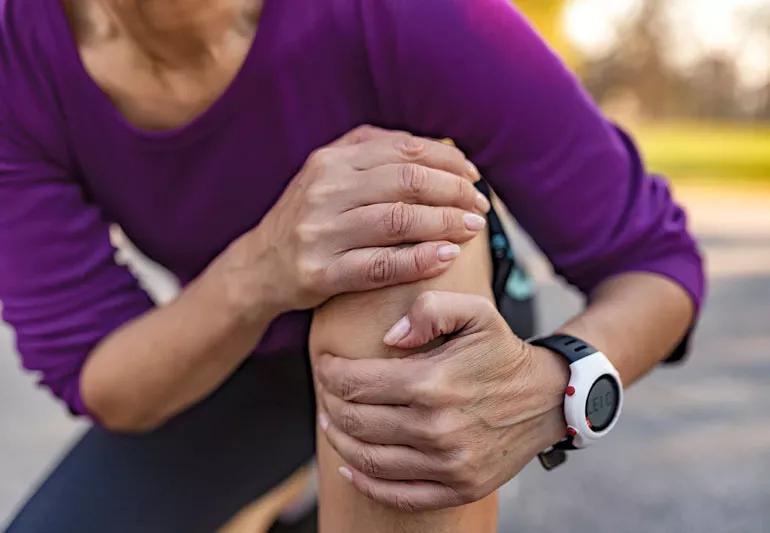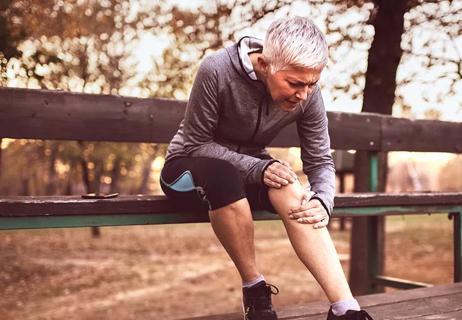Don't let these aches and pains set you back

Knee pain doesn’t just hamper your exercise routine. It can also hinder your day-to-day life, causing adverse changes to everything from routine chores to simply going up and down your stairs.
Advertisement
Cleveland Clinic is a non-profit academic medical center. Advertising on our site helps support our mission. We do not endorse non-Cleveland Clinic products or services. Policy
Even more important is how you deal with the pain. Is it just a temporary ache or is it a nagging injury that just doesn’t seem to heal? Getting the right diagnosis is extremely important but so is how you treat the pain.
In fact, you may even be making your knee pain worse without even realizing it. We spoke with orthopedic surgeon John McLaughlin, DO, about the ways you could be exacerbating your knee pain and what you can do to side-step those issues — and, hopefully, heal.
If you’re a runner, you’re probably no stranger to aches and pains that can be caused by running on pavement or other hard surfaces like old tracks or sidewalks.
While the exercise is definitely a big plus, the stress from running on pavement can cause your knees (not to mention your back and hips) additional troubles.
Other forms of exercise that involve pounding your feet across hard surfaces, like playing basketball or CrossFit, can cause similar stress, which Dr. McLaughlin refers to as repetitive impact loading of the knees.
“The repetitive loading we worry about is when your foot is actually coming off the ground or surface that you’re working out on,” Dr. McLaughlin says. For example, he points out that with an elliptical machine, your foot never really leaves the surface of the pedal and when you walk or hike, there’s a lot less load on the joint due to the lighter force of the impact of your foot on the ground.
Advertisement
“Running and box jumps and basketball, though, that’s a different type of load impact,” he says. “When you have that repetitive impact loading, it’s going to exacerbate knee pain.”
if running on hard surfaces is causing you knee pain, try switching to softer surfaces, if possible, like running trails or tracks made of synthetic material that are more forgiving on the knees. Treadmills and ellipticals also cause less stress on the knees while letting you get a workout in.
Dr. McLaughlin also suggests considering an alternate mode of exercise — like an elliptical machine or swimming — to ease the wear and tear on your knees.
Gritting your teeth through pain may be the subject of motivational posters but it’s actually not great for your body. That pain is your body’s way of telling you something and you should listen, especially when it comes to your knees.
It’s important, too, to recognize the difference between soreness and sharper pains. “Soreness after athletic activities like running is normal,” Dr. McLaughlin says.
The problem is ignoring those sharper, more persistent pains. Whether it’s not making that switch in exercises or running surfaces or simply ignoring persistent pain, “Not listening to pain in the joints is detrimental,” he notes.
Other signs you might be ignoring that you should address include swelling. “Swelling, sometimes accompanied by tightness and long-duration pain, pain that doesn’t show improvement with activity modification, are other signals that something’s not right with your knees,” Dr. McLaughlin adds.
And if you’re routinely using anti-inflammatory medications just so you can complete these activities, Dr. McLaughlin you should definitely seek out your healthcare provider or an orthopedic specialist.
When it comes to exercising and knee pain, being overweight is another risk factor. The concept is simple: More weight on your joints means more stress for that impact load.
“Your body weight is increased through the knee during flexion,” Dr. McLaughlin says. “If you’re 10 pounds overweight, that can add up to 50 pounds more weight through the knee with each step.”
Conversely, though, studies have shown that every pound lost can result in up to a 4-fold reduction of stress on each knee with each impact. In other words, if you lose 10 pounds, that equals 40 pounds less in load through your knee.
Again, consider exercises like swimming, elliptical training, or even cycling for solid workouts that can help you lose a few pounds (combined with a healthy diet) while protecting your knees from added pain.
Advertisement
Improper gear and bad mechanics could have a big impact on knee pain if you’re a runner or heavy-mileage walker.
If you’re running, make sure you’re using the proper shoes. Getting the proper fit for your feet is a more complicated process than just picking a pair off the shelf — but it’s worth it.
Whether it’s dealing with a high or low arch, the type of midsole a shoe has or the need for stability, picking the right running shoes can have a huge impact on lessening knee pain. Additionally, certain sole inserts can also add extra cushioning that help manage the load through your knees, hips and back.
The need for proper gear extends to how you run, too. It’s possible your running or walking form is incorrect and when you’re using that form repeatedly, it’s going to lead to pain and injury.
A gait analysis, performed by a physical therapist or exercise physiologist, can pinpoint mechanical issues in your gait which will lead to the recommendations for stretches, gear and changes to your stride that will improve your exercising and alleviate pain.
If none of these changes or even rest help ease the pain, consult your Cleveland Clinic healthcare provider to ensure there’s not something more serious behind the aches.
Advertisement
Advertisement
Learn more about our editorial process.
Advertisement

Your knees could be hurting at bedtime because of inflammation, injury or some other condition that gets worse with pressure and positioning

Arthritic knees can benefit from bridging, mini squats, balancing exercises and other stretches

Work on building strength and flexibility to keep the joints moving

Consider these common reasons for knee pain

Understanding your options

After knee arthroplasty, swelling-related pain is common, but infection and blood clots are also risks

This chronic condition most commonly causes pelvic pain and severe cramping during periods, but it can bring other types of pain symptoms, too

Looking down at your smartphone or computer screen can stress muscles in your neck, shoulders and back

Wearing a scarf, adjusting your outdoor activities and following your asthma treatment plan can help limit breathing problems

Your diet in the weeks, days and hours ahead of your race can power you to the finish line

When someone guilt trips you, they’re using emotionally manipulative behavior to try to get you to act a certain way